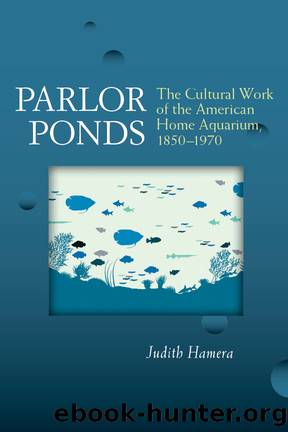Parlor Ponds by Hamera Judith;

Author:Hamera, Judith;
Language: eng
Format: epub
Publisher: University of Michigan Press
Surrogation
Fish became things through their literal immersion in the technology that kept them alive in the home. They become companion animals because they could be constructed as objects of owner's responses to them (e.g., becoming peacefully or attentively engaged) or actions against them (cruelty, neglect). They become social actors because, in the zooetic great chain of being, both their thingness and their liveness give them a unique rhetorical fluidity. Lorraine Daston and Gregg Mitman point out that animals generally are useful figures for cultural work because they resist simple symbolic fixity.
Animals are not just one symbol system out of many, one of the innumerable possibilities to externalize and dramatize what humans think. They are privileged and they are performative. They do not just stand for something, as a word stands for a thing or a rhetorical trope figures something else; they do something.41
But even in this expansive context, fish offer a larger repertoire for figuration and substitution: from the evolutionary âprimitiveâ to a technological advance, from a resident of unseen depths to a constantly visible domestic amusement or pet, actively real and thoroughly artificial, sharing affinities with human caretakers and yet absolutely other.
In Cities of the Dead, Joseph Roach describes surrogation as a process of substitution that fills vacancies in the social fabric.42 Certainly, the aquarium as a whole operates as a surrogate, suturing the various ruptures of modernity together and making the process and result reassuringly available for repeat viewing in the home. Thus, as the early aquarium writings discussed in chapters 2 and 3 demonstrate, the tank repairs estrangement from both nature and the rural countryside. But surrogation is not only a process of plugging the holes to fill these putative vacancies. It is also a managerial strategy in which a model-substitute offers laboratory opportunities for imagining ongoing social complexities, tweaking aspects of the model along the way to accommodate and negotiate new variables. The aquarium generally and fish in particular are exemplary and productive surrogates in this regard because they offer a representational golden mean to use as a model: not a blank slate where projection gets free rein, but just blank enough. Fish offer palpable liveness and recognizable behaviors without even the limited capacity for back talk of the family dog or cat; most don't bark, bite, cuddle, or flee. Their liveness, combined with their mute âthingness,â makes them representationally fungible; they can serve as surrogates for a wide range of subjects and objects, relatively unencumbered by the typical historical baggage that frames thinking and feeling with animalsâtimeworn formulas like the loyal dog, independent cat, and treacherous serpent. They can stand for bodies of water, even entire continents, and through the partnership of condescension and dominion that characterizes pet keeping, they make these places and peoples conceptually docile and manageable as well.43 Yet, as Roach indicates, the process of surrogation is always imperfect; the hole is never perfectly plugged. Like national landscapes in the mid-nineteenth century, there is always the potential for disconcerting ambivalences and slips that reveal new anxieties while containing others.
Download
This site does not store any files on its server. We only index and link to content provided by other sites. Please contact the content providers to delete copyright contents if any and email us, we'll remove relevant links or contents immediately.
| Birds | Cats |
| Dogs | Essays |
| Fish & Aquariums | Food & Nutrition |
| Horses | Insects & Spiders |
| Mice, Hamsters & Guinea Pigs | Pet Loss |
| Rabbits | Reptiles & Amphibians |
Finding Gobi by Dion Leonard(2632)
Grumpy Cat by Grumpy Cat(2466)
A New Earth: Awakening to Your Life's Purpose by Eckhart Tolle(2372)
The Silkworm by Robert Galbraith(2345)
Tippi by Tippi Hedren(2098)
End of Days by Sylvia Browne(2051)
Total Cat Mojo by Jackson Galaxy(1920)
Backyard Chickens Beyond the Basics by Pam Freeman(1851)
The Animals Among Us by John Bradshaw(1751)
The Ultimate Pet Health Guide by Gary Richter(1682)
Vet in Harness by James Herriot(1613)
All Things Bright and Beautiful by James Herriot(1611)
Doggy Desserts: 125 Homemade Treats for Happy, Healthy Dogs by Cheryl Gianfrancesco(1588)
Cesar's Way by Cesar Millan(1584)
Dog Years by Mark Doty(1571)
Chicken Soup for the Ocean Lover's Soul by Jack Canfield(1548)
Walking with Peety by Eric O'Grey(1504)
Dog Training 101 by Kyra Sundance(1504)
Encyclopedia of Dog Breeds by D. Caroline Coile Ph.D(1390)
